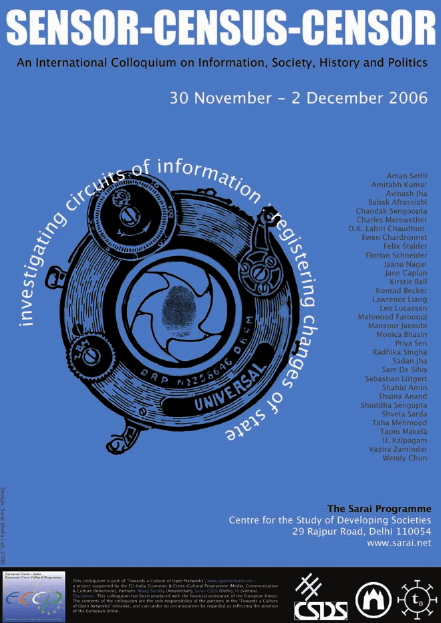Sarai Media Lab (eds.): Sensor-Census-Sensor: An International Colloquium on Information, Society, History and Politics. A Report (2007)
Filed under report | Tags: · censorship, india, information society, neoliberalism, networks, politics, surveillance, technology

This book is a report on the International Colloquium that took place from November 30th, 2006 to December 2nd, 2006
Critical examination and investigation of the regimes and technologies of information harvesting, management, circulation and deployment as they have developed in India and Europe from early modernity till today.
The colloquium was organized by the Sarai Programme at CSDS, Delhi, in collaboration with the Waag Society, Amsterdam, and t0, Vienna, under the rubric of the network titled ‘Towards a Culture of Open Networks’
Sensor-Census-Sensor: Investigating Circuits of Information, Registering Changes of State
Produced and designed at the Sarai Media Lab, Delhi
Published by: The Sarai Programme, Delhi, India, November 2007
ISBN 9788190585378
PDF (PDF chapters, updated on 2014-8-29)
Comment (0)Konrad Becker: Die Politik der Infosphäre: World-Information.Org (2003) [German]
Filed under book | Tags: · arpanet, democracy, information society, internet, politics, privacy, security

Wir leben in einer Zeit des Übergangs zwischen einem Zeitalter, das auf industrieller Produktion basiert, und einer Gesellschaft, in der die Schaffung und der Austausch von Informationen den Mittelpunkt bilden. Mit der Entwicklung von Informations- und Kommunikationstechnologien ist eine neue, globalisierte Wirtschaft auf dem Vormarsch, die nicht nur aktuelle politische Vorgänge beeinflusst. Gleichfalls hinterfragt sie den inneren Zusammenhalt der Gesellschaft, die traditionellen Werte und das bisherige Verständnis von Arbeit und Kultur.
“Die Politik der Infosphäre World-Information.Org” untersucht diese dramatischen Veränderungen und zeigt aktuelle Tendenzen dieses gesellschaftlichen Wandels auf.
Editors Konrad Becker, Institut für Neue Kulturtechnol
Publisher VS Verlag, 2003
ISBN 3810038660, 9783810038661
Length 272 pages
PDF (PDF by chapter)
Comment (0)John Thackara: In the Bubble. Designing in a Complex World (2005)
Filed under book | Tags: · design, information society, interaction design, internet, learning, smart mobs, technology, telerobotics

We’re filling up the world with technology and devices, but we’ve lost sight of an important question: What is this stuff for? What value does it add to our lives? So asks author John Thackara in his new book, In the Bubble: Designing for a Complex World.
These are tough questions for the pushers of technology to answer. Our economic system is centered on technology, so it would be no small matter if “tech” ceased to be an end-in-itself in our daily lives.
Technology is not going to go away, but the time to discuss the end it will serve is before we deploy it, not after. We need to ask what purpose will be served by the broadband communications, smart materials, wearable computing, and connected appliances that we’re unleashing upon the world. We need to ask what impact all this stuff will have on our daily lives. Who will look after it, and how?
In the Bubble is about a world based less on stuff and more on people. Thackara describes a transformation that is taking place now—not in a remote science fiction future; it’s not about, as he puts it, “the schlock of the new” but about radical innovation already emerging in daily life. We are regaining respect for what people can do that technology can’t. In the Bubble describes services designed to help people carry out daily activities in new ways. Many of these services involve technology—ranging from body implants to wide-bodied jets. But objects and systems play a supporting role in a people-centered world. The design focus is on services, not things. And new principles—above all, lightness—inform the way these services are designed and used. At the heart of In the Bubble is a belief, informed by a wealth of real-world examples, that ethics and responsibility can inform design decisions without impeding social and technical innovation.
Publisher MIT Press, 2005
ISBN 0262201577, 9780262201575
321 pages
PDF (updated on 2012-11-23)
Comment (0)
